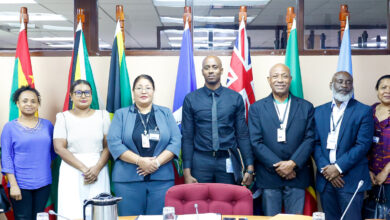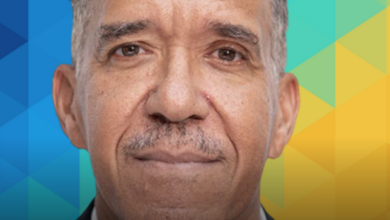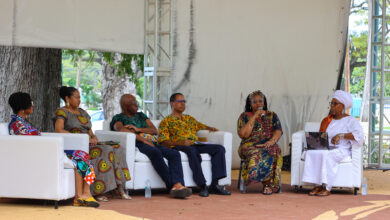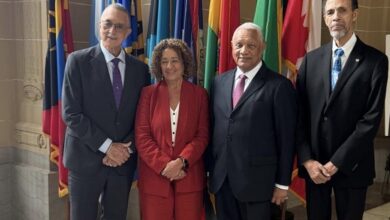This is for me a most pleasant duty to extend a very warm welcome to all of you, to those participants and presenters who have travelled to Guyana and in particular to those of you for whom this is your first visit to the site of the Headquarters of the Caribbean Community. I would like to acknowledge some of the persons in our midst from whom I received my nurturing and training and without whose continued guidance and advice I would not be standing here today – I refer to Ambassadors Noel Sinclair and Cheryl Miles, former Foreign Minister Jackson and Mrs Yvonne Mbozi, former Chief of Protocol.
I hope that you will enjoy the warmth of our own brand of hospitality for which we have become known and of which we are truly proud.
I would like to publicly express appreciation to the Commonwealth Secretariat and the Institute of International Relations of the University of the West Indies for responding so readily to Member States’ request for assistance in strengthening and enhancing the capacities of their respective Foreign Ministries to meet and cope with the challenges of the international environment; and to be even more responsive in contributing to the ongoing task of nation building.
Permit me to share some views with those officers who will be participating in this Workshop which I feel is very timely. It will I hope, serve to heighten the awareness amongst our mid-career diplomats who will someday find themselves in leadership roles in their respective Foreign Ministries, of one of the fundamental objectives of the Treaty of Chaguaramas. This Treaty and its Revised Version recognizes the centrality of Foreign Policy to the development and strengthening of the Caribbean Community. It is one of the pillars upon which our Community is founded. Since the first meeting of the Standing Committee of Ministers of Foreign Affairs was held in Guyana in 1973, the Community has recorded significant achievements which are indeed impressive. Our collective action in establishing diplomatic relations with Cuba for example, was not simply an act of great courage and statesmanship at the time. Its success should also be measured by the fact that it virtually ended the global isolation of Cuba. But its real importance from a Community perspective lies in the fact that the diplomatic recognition act was based on a clear and unambiguous appreciation of what was in the best interests of the Community; what could increase its potential strength within the global environment despite its small size; and what potential benefits could be derived from such collective action.
Through the years there have been similar foreign policy successes, some less dramatic perhaps, which have been based less on a focus on the physical aspects of foreign policy coordination such as joint representation and more on what is good, even necessary, for the Community as a whole. Surely this latter is what underpins this very important pillar of the Community’s structure.
One of our more recent achievements was to develop a Foreign Policy Coordination Strategy which has been refined and reformulated in keeping with the challenges and priorities of the day. The seeds of this strategy were planted here in Guyana in 2001 at Baracara Island on the Essequibo River. That environment, once some of our visitors had recovered from the overpowering might of our Essequibo River, helped senior officials and subsequently Foreign Ministers to stimulate the thinking and finally the decisions which led to the formulation of this coordinated strategy.
The strength of the Caribbean Community derives from the collective wisdom and advocacy of its individual members and in this context the Community’s external relations need to be driven by the wisdom, experience and advocacy of the region’s Foreign Service Officers. Over the next week or so you will be exposed to training in specific disciplines; there will be opportunities to improve on the job performance; for many it will be an occasion to broaden your vision as you internalise the experience of others.
Permit me here to add another component not featured as a specific item on your Agenda. I refer here to networking. I would like to encourage you, the participants, to consciously get to know your colleagues at a level that would allow for ongoing interaction long after this Workshop is ended. Use all available communication networks to enhance this sharing experience. You may indeed meet subsequently at Conferences and related activities or even in capitals to which you might be posted, but I can assure you that there is no substitute for a process of ongoing networking particularly if this is to be directed at creating a stronger and more viable Caribbean Community.
Apart from the focus of this Workshop in meeting the capacity building needs of your respective Foreign Ministries to cope with the increasing global challenges, there is another important dimension to its purpose which is the deepening and strengthening of the Caribbean Community. You are uniquely placed, in the advice you give, the decisions you implement and in your ongoing assessments, to ensure that this dimension does not get lost in the struggle for national survival. The founding fathers of our Community were guided by the philosophy, indeed the conviction that the Region’s strength lay not in a ‘crab in the barrel’ struggle for survival but in the measured focus on specific areas where our collective strength could make a significant difference both as a Community and internationally. The determination we have to make is what is best for the Community and what collective contributions in the external environment can and indeed must be made to realise these objectives.
You know too well the kind of world we live in and the imperative to come to grips with its ever changing political and economic landscape if we are to survive, let alone climb the ladder of social and economic prosperity. During the Workshop you will no doubt get a better appreciation of how the world has not changed despite for example the introduction of the seemingly progressive World Trade Organization. You will note that in spite of statistical indicators of global progress we remain as vulnerable as ever with the further inherent disadvantage of being small states however defined by the developed industrialized world. In this globalized society in which we are living we continue to be marginalised.
What more does it take for us to internalise with commitment and conviction that our best hope for survival and progress as Member States lies in the leverage we can exert, as a Community, in our quest for a better life for our respective peoples.
In April of this year, the historic Fifth Summit of the Americas was successfully concluded in Port-of-Spain, Trinidad and Tobago. From the perspective of the substance of these remarks, the Summit provided an opportunity for our Heads of Government to agree on a set of issues which they felt were in the Community’s interest to raise with the President of the United States of America. The issues included drug trafficking, Climate Change, the role of the International Financial Institutions and the imperative for the US to understand and respect the special concerns of the Community, comprising for the most part small island states as well as the need for attitudinal changes towards the Community.
What should be distilled from this are those issues that our Heads of Government considered ought to be pursued in the best interests of the Community as a whole. The Community’s Agenda whether it is at the level of Heads of Government meetings or that of the Council of Foreign and Community Relations (COFCOR) should have among its principal items for discussion and action all those issues already referred to which already have been approved for Community pursuit and action. All of this underscores the importance and relevance of a coordinated foreign policy strategy and in our quest for strengthening our individual Foreign Ministries we must not forget this wider purpose of Community strengthening.
As you pursue this programme, I would urge that you let your thoughts and actions be guided by the vision of the founding fathers of CARIFTA and also by the inevitable response to the imperatives of the late 20th Century geo-political imperatives which was the creation of the Caribbean Community and Common Market. So often we forget why we have really formed ourselves into a Community and at times, inevitably, why we fail to distinguish with any degree of clarity the woods from the trees, the sovereign from the regional, and the national from the common good of the Community.
To all of you, I wish to express my sincere hope that you will experience here in Guyana the true meaning and spirit of the Caribbean Community that underlines the Treaty of Chaguaramas and its Revision just under a decade ago – a Revision which clearly reflects the increasing imperative to deepen our commitment to our Community. Guyana has always sought to be true and faithful to that commitment.
Let me close by repeating once again my welcome to you and my wish that you have a productive and rewarding session.





